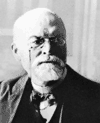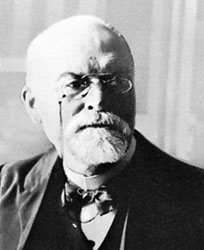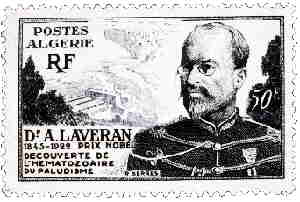
|
Alphonse Laveran
(18 Jun 1845 - 18 May 1922)
French physician, pathologist and parasitologist.
|

(BBC Hulton Picture Library)
Alphonse Laveran

Alphonse (Charles Louis) Laveran was born 18 Jun 1845 in Paris, France. His father was the physician Louis Théodore Laveran, and Alphonse also took up military medicine as profession. He obtained his medical degree from University of Strasbourg, Germany, and began a long and distinguished career as a physician, pathologist and parasitologist.
He began as an army surgeon in the Franco-German War (1870-71). By 1874, he was appointed as professor of military medicine and epidemic diseases at the military college of Val de Grâce (1874-78, 1884-94).
In Algeria, 1879-83, Laveran began his research at the military hospital of Bône. At the outset, he only set himself the task of explaining the role of the particles of black pigment found in the blood of people suffering from malaria. After 1850, when these particles, called melanins, were discovered, methods had been discussed of determining whether they were only to be found in patients suffering from malaria, or were present in other diseases as well.
By careful observation viewing blood slides under a microscope, Laveran discovered that it was a parasite in red blood cells that causes human malaria (1880). Laveran later showed that the parasites, during their development in the red blood corpuscles, destroy them; and the red pigment in the corpuscles is changed into the melanin particles.
The new parasite discovered by Laveran was not a bacterium. Although it was impossible to classify accurately, certain resemblances to other micro-organisms put it in the same group as the protozoa.
From extensive negative results searching for the parasite in samples of water, soil, and air, Laveran hypothesized that the marsh-fever parasite must undergo one phase of its development in mosquitoes, and be inoculated into humans by their bites. He made an analogy with Manson's mosquito-borne mode of transmission of the Filaria worm.
When Laveran was recalled from Algeria to Paris, and so forced to interrupt his work on malaria, he had already clearly formulated the problems that had first to be solved in this field. He then tried to solve them by an indirect approach, by studying animal parasites. Parasites of birds had only recently been discovered and showed resemblances to the malarial parasites.
He became the founder of the medical field of protozoology doing important work on other protozoal diseases, including sleeping-sickness and kala-azar. Laveran's careful studies, more than anyone else, extended the understanding of the finer points of the morphology, biology, and pathological activity of the parasites. He published his discoveries, sometimes in collaboration with other workers, in many articles and annotations, and later, in 1904, he gathered them together in one great work, thus far unique of its kind: Les trypanosomes et trypanosomiasis.
For the remainder of his life, from 1896, he was a researcher the Pasteur Institute at Paris. In 1907, Laveran founded the Laboratory of Tropical Diseases at the Pasteur Institute and founded the Société de Pathologie Exotique (1908).
In recognition of his work on the role played by protozoa in causing diseases, he received the 1907 Nobel Prize in physiology or medicine.
He died in 1922.
Laveran's published work includes Traité des fièvres palustres avec la description des microbes du paludisme (1884); and Traité des maladies et épidémies des armées (1875).
- Science Quotes by Alphonse Laveran.
- 18 Jun - short biography, births, deaths and events on date of Laveran's birth.
- Presentation Speech for Alphonse Laveran - for the award of the Nobel Prize from The Nobel Foundation site.
- Biography for Alphonse Laveran - at The Nobel Foundation site.
- Stamping Out Malaria - archived copy of The Child's Doctor column illustrating the history of malaria shown with postal stamps from around the world.
- The History of Malaria - archive copy of a Fact Sheet on Malaria
- Malaria Jump Page - archive copy of a page of malaria links as linked our article in 1999
- Booklist for Malaria History.





